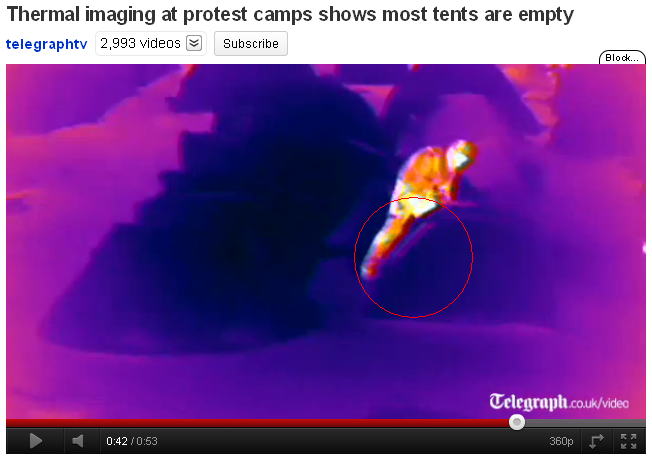Thermal Imaging Cameras Prove Occupy London More Inhabited Than City Bankers’ Homes: Reptiles Are Cold Blooded
 IS Occupy London a success? The right-wing press point to the empty tents, left behind as protestors go home to heat, light and telly, as evidence of laziness and lack of vim. The news that 90% of all tents are empty was spotted by the Times,Telegraph, Sun, and Daily Mail. The revelation was apparently based on thermal imaging cameras attached to a police chopper. The Telegraph then conducted its own survey.
IS Occupy London a success? The right-wing press point to the empty tents, left behind as protestors go home to heat, light and telly, as evidence of laziness and lack of vim. The news that 90% of all tents are empty was spotted by the Times,Telegraph, Sun, and Daily Mail. The revelation was apparently based on thermal imaging cameras attached to a police chopper. The Telegraph then conducted its own survey.
The 90% figure seems to have been sparked by Corporation of London councillor Matthew Richardson, who told the Daily Mail:
“It’s incredible. The overnight monitoring of the site by the police showed that 90 per cent of the tents are unoccupied. It just shows most of the demonstrators don’t have the courage of their convictions and are just here to make trouble. Leaving your tent here overnight is a good way to do it. It’s a phantom camp – a big charade.”
The same thermal imaging cameras might be trained on City banks and offices during the night to see how useful those buildings are. In the interests of fairness, Anorak has shone thermal cameras at City workers’ homes, both first, second and third. We can reveal that only 5% are occupied at night.
Says our expert:
“The thermal images only pick up warm-blooded humans. Chances are they will be useless on bankers, recording only the presence of cleaners, au pairs and lap-dancers.”
The left-wing press points towards the protestors disabilities, jobs and that not everyone who wants to protest fancies sitting in the cold and the wet without a break.
11921114
Posted: 26th, October 2011 | In: Key Posts, Reviews Comment (1) | TrackBack | Permalink



